'Right now, the Bank of the Republic has reasons to be cautious, one of which is the country's fiscal situation': interview with Bruce Mac Master

Just days before the 10th Colombian Business Congress (CEC) in Cartagena, Bruce Mac Master, president of Andi, gave a detailed account of the current economic situation in Colombia, declaring himself less than optimistic that the country will be able to achieve a path of sustained growth at this point in the current administration.
In an interview with EL TIEMPO, the union spokesperson addressed, for example, the current state of relations between business leaders and the government, the deteriorating security situation, the constant strikes and blockades, as well as some reasons for the current growth (remittances and coffee) and the volume of taxes that the productive sector will end up paying even without tax reform, among other key issues.
Are relations between the government and business leaders at a point of no return, that is, broken? I wouldn't dare say so because there are things that continue to flow, albeit with some obstacles. There are two or three areas of the government with which it's impossible to talk. The president himself (Gustavo Petro), let's say, is a person who has difficulty communicating, not only with us, but also with his ministers and subordinates. Beyond him, we've been working with several ministries. Perhaps the only one with which we have almost no productive conversations is the Ministry of Health. Now, with the Constitutional Court's order for us to work together on the definition of the UPC (Capital Payment Unit), there is a legal obligation to sit down and talk with us. There was already a first meeting; the second was adjourned due to a lack of quorum on Wednesday, but we'll have to talk there, whether the minister wants it or not. If you asked me, I would say that the scenario we have sought and will not abandon is that of working. We don't have to become friends, or have lunch together, or share our private lives, but we have an obligation to work, and to that end, we have open channels with various areas of government, some of them very productively.
Do you share the economic vision of the balance sheet presented by President Petro? I've always said that leaders have an obligation to try to sell citizens good results in terms of their management, but when you look at the numbers, there's a huge discrepancy. For example, in terms of employment, one can't boast about what's happened in recent years: a drop in unemployment compared to production and the rise of informality, which is very bad news for a country like Colombia because it produces poverty, inequality, unfair competition, and hits households hard. Of every 10 new jobs, 7 are for people in informal employment, so there's a big gap.
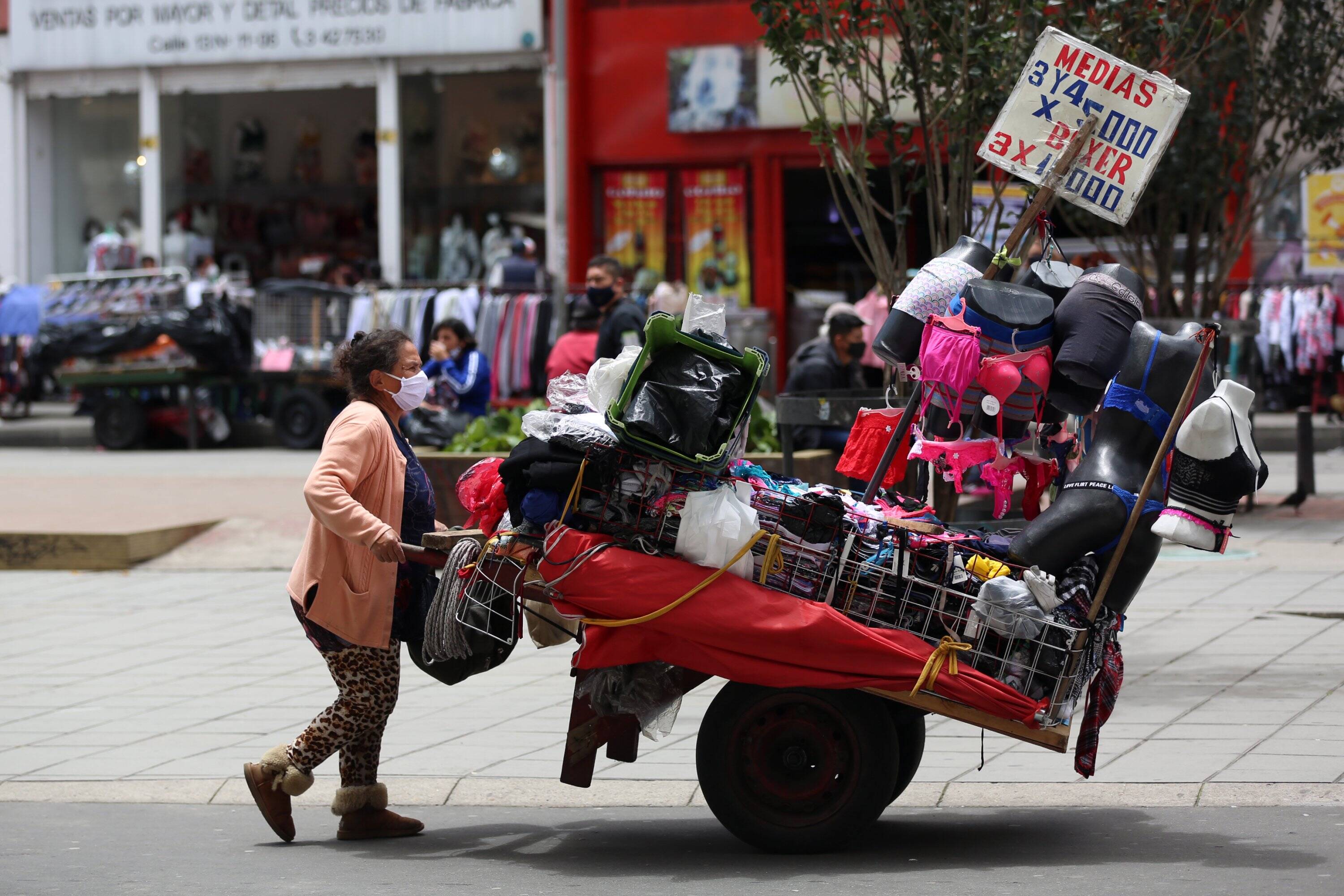
Informal employment has been growing in recent years, with the rate exceeding 56 percent. Photo: César Melgarejo. EL TIEMPO
We also have significant differences regarding the poverty figures you mentioned because we all know that a large number of anti-poverty programs were eliminated, and fortunately, local leaders decided to replace them. The same applies to public investment; it is being carried out by local authorities, such as the Toyo Tunnel in Antioquia, the Malecón and coastal protection projects being implemented in Cartagena, or the Bogotá Metro, which until now has not been funded with state resources.
What we have right now is an economy with many problems, in intensive care on four or five fronts, and if we deny that reality, we'll never solve anything. I would rather call on us to recognize where the weaknesses lie so we can try to ensure this last year isn't wasted. Colombia can't continue wasting time on fiscal matters, health, energy, the ability to generate security and control over the territory, or not, and on international relations. Colombia has no need to create a new dispute with Peru when we aren't even capable of controlling the national territory.
One of the key issues has been the deterioration of security, which even business owners have been repeatedly calling for... We all know that Colombia is not viable without security for several reasons. First, because its citizens don't live in peace, and peace is an intangible asset. People in the countryside and in small and medium-sized cities are abandoned. Second, we have an obligation to create conditions of certainty for the productive sector so they can carry out their activities peacefully. Let's look at what has happened with the blockades, which were in some way invented by those currently in government because they were, in some way, the leaders of what they call the "social outbreak," but which I call the national strike (2021). Every day there is a new strike, and that doesn't allow the country to function properly. We have no way to move products, and it's very difficult to operate without security.
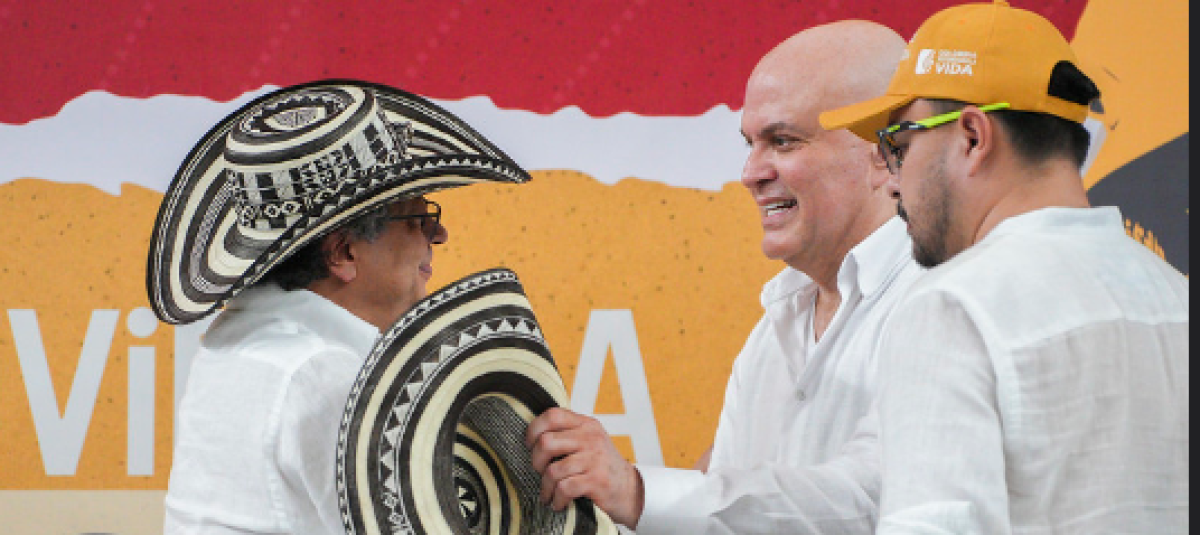
President Gustavo Petro and current peace broker Salvatore Mancuso. Photo: Archive
I dare admit that the President probably had good intentions when he spoke of total peace, saying that it cannot be achieved by a group alone. I understand and agree with that. But if one finds that the current form, methodology, and approach to the problem do not produce a quick solution, the path must be corrected. The strategy must begin by strengthening the Armed Forces and Police, empowering them, of course, within the framework of human rights doctrine and within the law, from a State that must be the sole authority in the territory. So, until we have that, Colombia will not be a viable country.
It seems that strikes and blockades are the only way for the government to address the needs of many sectors in crisis. Of course, there is the free right to protest, which we must all protect, but it cannot be an unlimited and disproportionate right, as is currently happening. Someone with a personal interest—in these cases, an economic, individual, or collective one—feels they have the right to affect the entire population, and what ends up happening is undue pressure, with serious economic effects, even in humanitarian terms, to which we end up giving in on things that we are then unable to fulfill. So, we have to decide to what extent that right can be exercised, how it can be exercised, and whether it can truly affect the entire society or not, because pressuring society also leads to it producing unfulfillable conditions that will generate an ever-increasing problem.
What happened to the Security Observatory that was created last year? This observatory was installed in the Trade Council and monitors many issues, including blockades, extortion, which is on the rise, kidnappings, citizen insecurity, homicides, and murders. The situation is not good; we can't say that Colombia is in a good situation right now from a security perspective. And we could fall into looking at the military and police forces and asking why they aren't doing what they should be doing, but the truth is that they have been deprived of the resources necessary to operate, and if they aren't given sufficient support, it's very difficult to demand results from them, so I think that's where the problem lies. We can't remain in a situation where the military and police forces ease pressure on these groups while they continue to grow or others emerge with a high capacity to terrorize the population. Living in fear, even if we have food, education, and healthcare, is not good.
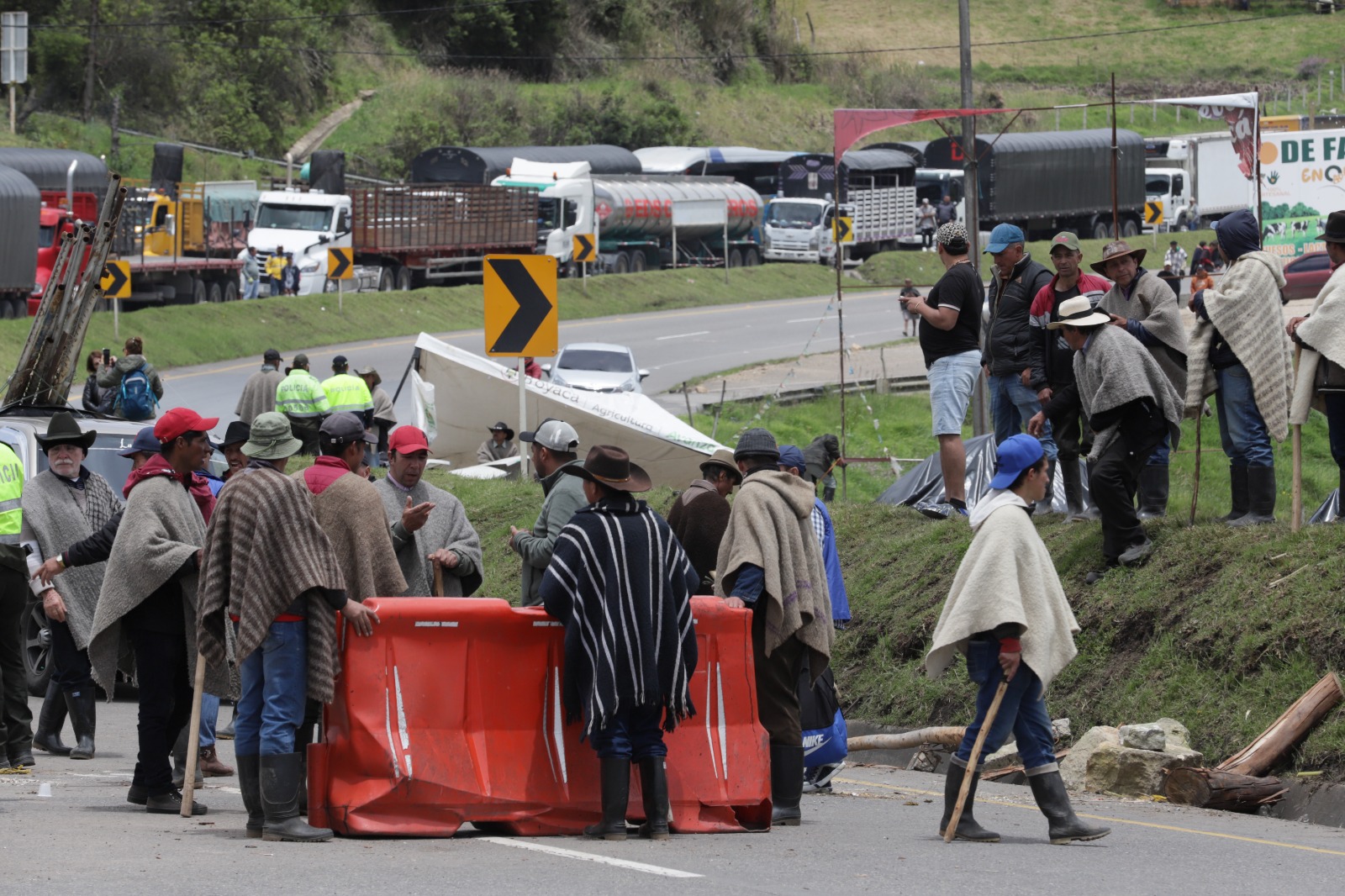
Miners' strike in Boyacá Photo: Harvey Medina
Our growth, fortunately, is not at the levels of two years ago, 0.7 or 1.7 percent by 2024. This year, forecasts place us at around 2.5 or 2.7 percent; we are growing slowly. Now, is that enough? The answer is no. But there is another, more interesting question: how sustainable is it? We must analyze what growth we are talking about, whether it comes from increased consumption, and if the sources of this growth do not depend on us, such as the remittances families receive—around $1.1 billion per month—whether they will continue or not. There is also the issue of the "coffee boom" we are experiencing due to a good harvest, but above all to a very good price per pound on international markets, which has given greater purchasing power to some 600,000 families. There is one component the President gives more importance to, and it is not true that it has any, and that is the capacity related to the minimum wage and its recent high increases, which has partly prevented inflation from falling more quickly, while the president unduly pressures the Board of the Central Bank to lower its interest rate.
Do you currently share the caution the issuer's board is taking in lowering that interest rate? We put a lot of pressure on the Bank (of the Republic) when rates were around 12 or 13 percent, it's true, but right now it has several reasons to be cautious: the state of public finances, inflation that's holding up, and the fact that Colombia could fall into a difficult situation regarding financing in international markets, because we're increasingly perceived as a greater risk. So the Bank will help us with the prudence that the government, or the President in particular, isn't promoting. The issuer is performing a very important role of checks and balances, and it's very serious when the President accuses it of electoral interests, when he discredits it and seeks to turn the public against it.
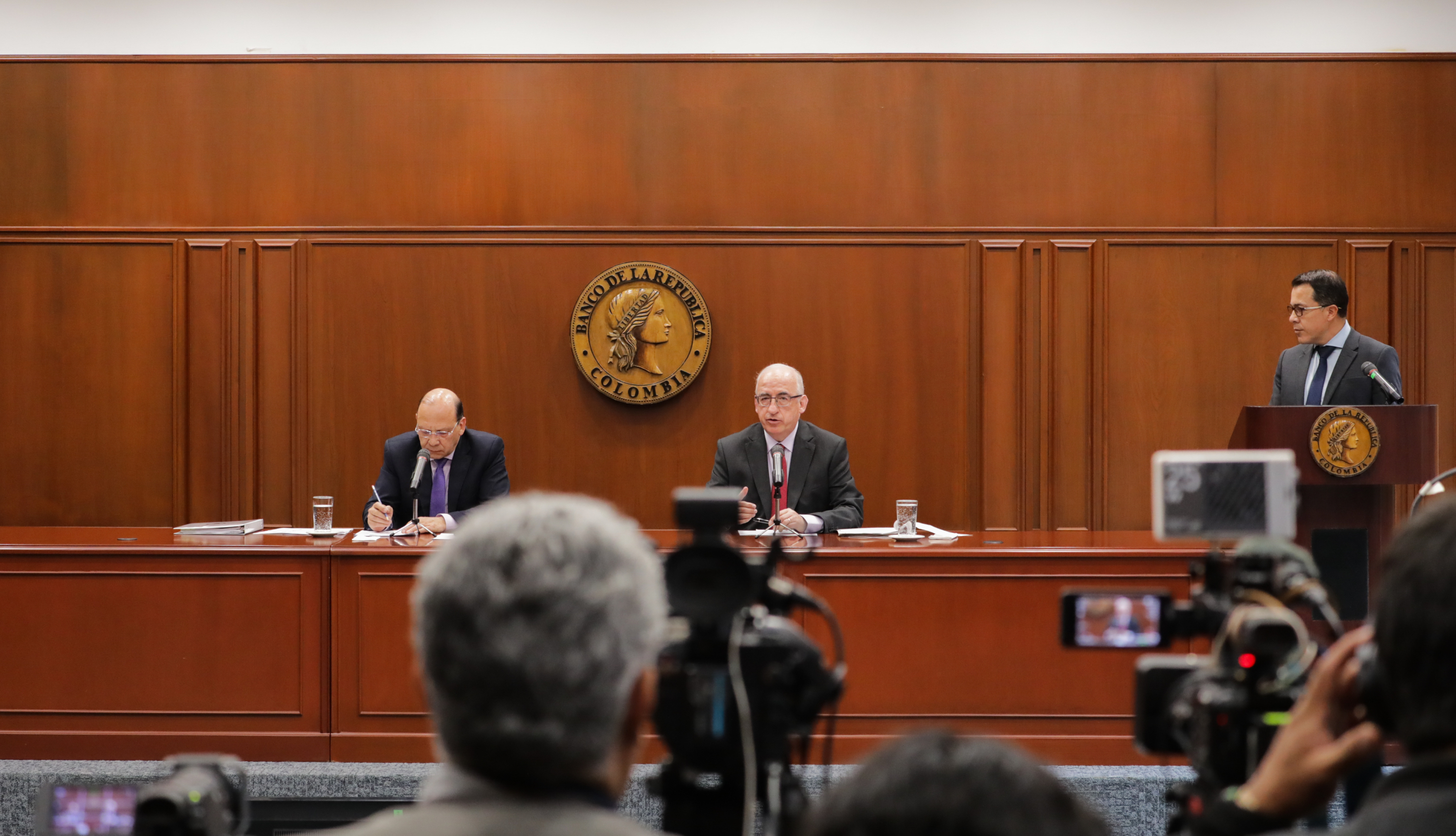
The Bank of the Republic's board kept the interest rate at 9.25% at its July meeting. Photo: Bank of the Republic
Well, we don't have a solid foundation for growth in the productive sector. The agricultural sector has grown, and the President rightly praises the figures, but they are especially due to the coffee sector, with 31 percent growth in the first quarter. Now, the government has stifled the infrastructure sector and also the construction sector, withdrawing support and generating the uncertainty this has generated. So, we have to get back on the path of economic growth, which is a very sophisticated exercise because it involves multiple factors. It requires the economy to invest, businesses to produce, consumers to consume, and banks to finance. If these four factors don't happen simultaneously, we won't have economic growth.
Given this scenario, is it possible that growth in 2026 will be slightly higher than expected this year? Nothing guarantees right now that we'll experience growth that's significantly different from the trend we've seen so far. What's more, if coffee prices and remittances were to fall, we'd have a huge problem.

Every month, on average, remittances amounting to approximately $1.1 billion enter the country. Photo: Sergio Acero. EL TIEMPO
Not just investor confidence, but also consumer confidence. Confidence must be one of the next government's primary objectives. We insist on this: your best industrial policy and tax reform are to build confidence. If you achieve those two goals, you'll have more investment, more economic activity, much more revenue collection, and greater capacity for Colombians to demand durable and semi-durable goods. But the government never played for that, but rather for building uncertainty.
With that, the next government won't have it easy, then... He will have a very difficult task, and if you ask me if we find that those currently in government become the opposition and decide to use the same strategy as in 2021, Colombia will have many problems stemming from those left by this government. We, the citizens, are experiencing a complex situation. We will probably have to make some very big sacrifices, but they must be the basis for society to stabilize.
What do the industry figures tell you? The entire industry has had nearly 36 very bad months, with some precarious, small growth, with some sectors occasionally growing, but the industry has actually suffered a significant downturn in recent months, and there are no reasons or indications that allow us to be optimistic going forward.
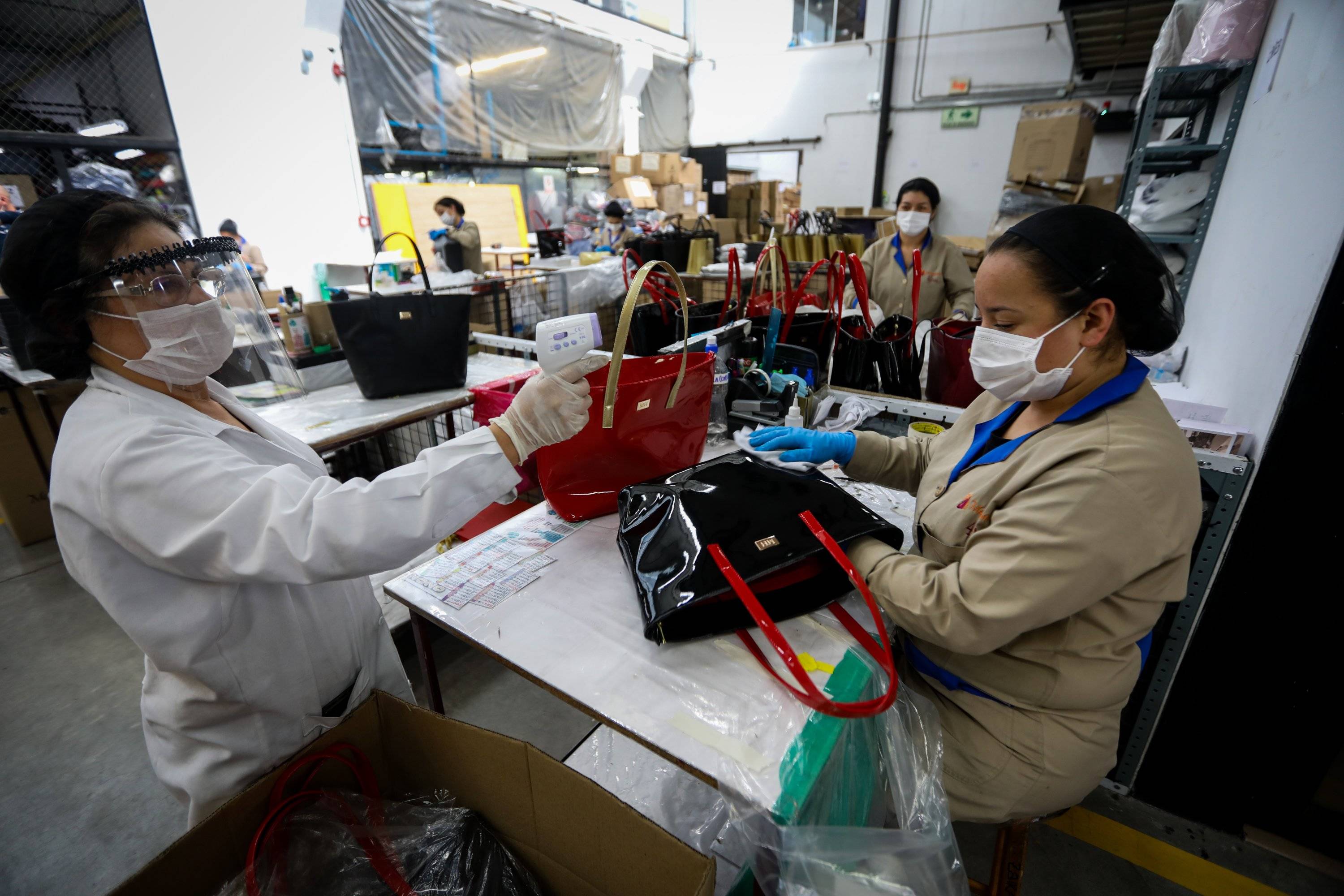
Manufacturing sectors have been performing negatively for 36 months. Photo: Mauricio Moreno. EL TIEMPO
I'd like to fully understand the government's strategy regarding the budget, because we had problems with the 511 billion pesos last year, and I don't know what they have in mind when they present a 557 billion peso budget and a 26 billion peso tax reform for an economy that is tighter, more indebted, and where spending is growing at exaggerated levels. I sincerely believe we're going to have to develop a very serious shock plan to try to limit how much the government can spend.
You say that business owners are willing to take a chance on recovery; they'd fight for another tax reform that included what... Many things, such as including people, companies, and sectors that don't pay taxes; you have to keep in mind that there are companies and sectors that can't pay more, that are at the top. Part of what needs to be defined is how we want to spend the money. Look at the current debt: this year the country will pay close to 100 billion pesos in debt service, and we're paying part of that, not only because the debt is high, but because the rates are very high. Colombia is paying absurdly high rates in international markets due to our strategy of creating uncertainty, and the markets are charging us for that. So we have to be trustworthy, and as long as we're not trustworthy, we're going to end up paying a lot.
Finally, how did you do with the tax advance? It's a stark reflection of the harsh reality that the government doesn't have support for the productive sector as a main agenda. Instead, it's looking for ways to permanently extract revenue from the productive sector, unconcerned that we have to bear an immense cost that wasn't budgeted for this year. The reality is that even though the income tax rate hasn't increased, the taxes we'll be paying in 2025 will be significantly higher than what we were going to pay at the beginning of the year. There hasn't been a formal tax reform yet, but we'll be paying more taxes, and that will put pressure on the Colombian productive apparatus.
eltiempo





